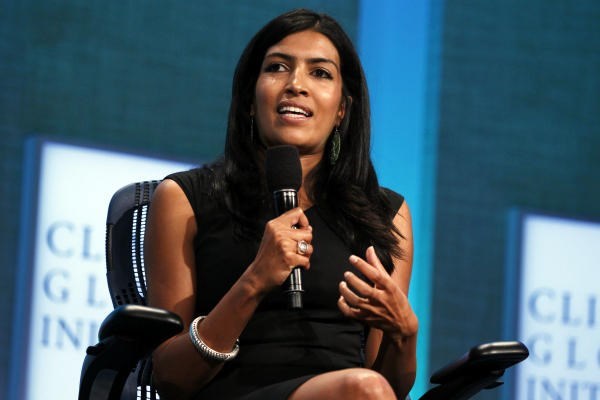 |
| CEO and founder of Samasource Leila Janah takes part in a session during the Clinton Global Initiative in New York in 2010. Samasource provides women in developing countries with 'microwork' via the Internet, reducing poverty.
Lucas Jackson/Reuters/File |
These five women are fighting poverty in a serious way, but they're not handing out aid. We hope to see them scale up their models this year and make an even bigger impact.
Leila Janah – Leila knows that what poor people really want is a job: steady income that pays for food, school, and medicine. But American companies that "outsource" work to poorer countries aren't exactly popular right now. To Leila, the concept of "microwork" isn't exactly outsourcing, either. She founded Samasource, a social enterprise that takes simple, computer-based tasks from companies like Intuit, Google, and LinkedIn and turns them into jobs for poor people in places like Kenya, Haiti, and India. These are tasks that would have been done poorly by a machine or not at all. For example, tagging user-generated content would be difficult for a computer, but the job also wouldn't pay enough for a US employee to make a comparable living. For Haitians who typically make $1 or $2 a day, a job that pays $5 a day can make all the difference in the world (and can buy a lot more in Port-Au-Prince, Haiti, than it can in New York City). Starting the year with a fresh grant from Google, watch Leila and Samasource scale the model this year. You might just see a meaningful way to reduce poverty and people rethinking what "outsourcing" means.
Esther Duflo - When you think of a wonky, numbers-obsessed economist, skeptically testing and retesting hypotheses, add a French accent and you've got Esther Duflo. When Esther spends hour upon hour with her nose in a stack of data, she's not doing it to publish her work in a journal that will pick up dust on the shelf. She's solving global poverty. Esther is a founder of the Abdul Latif Jameel Poverty Action Lab (J-PAL), an MIT-based think tank that says the only poverty solutions worth continuing are those that work. And we only know what works if we test it. That's not to say it's not worth pursuing new, innovative solutions. On the contrary, that's exactly what we should try when Esther's team finds evidence that a traditional policy isn't actually working. 2011 saw the publication of Esther's enthralling book, "Poor Economics," written with her partner in poverty-fighting crime, Abhijit V. Banerjee. We think 2012 is the year the Poverty Action Lab sees some serious action.
Jacqueline Novogratz - Jacqueline's organization, Acumen Fund, has been around for a decade, but watch her this year because "slow money" is gaining speed. Where most traditional investors want to bet big with sure-fire wins, Jacqueline's idea of "patient capital" means returns won't be quick and they won't be big, but they'll transform how we fight poverty. Her group identifies smart entrepreneurs who see the poor as customers who can make choices for themselves rather than as recipients of aid, and invests up to $2.5 million over five to seven years in such projects. For example, Acumen Fund invested a cool million into Global Easy Water Products, a for-profit company that developed an inexpensive, water-saving drip irrigation system sold to poor farmers. The company used the funds to scale up its production and has sold 350,000 systems, creating jobs and significantly increasing farmers' incomes. If you want to finance something worthwhile and get a big social impact (if a slightly smaller future return), the results of being patient are worth it.
Gabi Zedlmayer - You may know Hewlett-Packard for its information technology solutions, but soon you may know it for transforming the way companies leverage their expertise to alleviate poverty. It's been called "shared value," the "new capitalism," and "social investment." Gabi calls it her passion. She leads HP's global social innovations team, which combines its most innovative tech know-how with the brightest minds from nonprofit and government sectors to find real solutions to the world's most complex problems. Gabi's team is figuring out ways to bridge the so-called "digital divide" and intersect shareholder and social value. In concrete terms, Gabi's team has been working with small business entrepreneurs from Abujaq, Nigeria, to Tikamgarh, India, and recently figured out a way to instantly diagnose HIV in infants in Kenya. We're betting on Gabi to be this year's driving force in revolutionizing how private companies view people at the bottom of the wealth pyramid as partners in development.
Shainoor Khoja - In a country with 34 ATMs, cash is king. But it's not secure. Shainoor most recently led the social responsibility team at Afghanistan's largest telecommunications company, Roshan, using the group's technology edge to address her country's massive poverty challenges. The company created the world's second mobile money platform (behind Kenya's M-PESA), which has revolutionized financial transparency: For example, police officers are being paid their salaries without fear of cash-related security risks or the books being "fixed." Mobile money also boosts women's empowerment: Women can now be employed as microloan officers since they don't have to carry cash. In a country known for its lack of transparency and an extremely conservative stance on women's rights, Shainoor's position is unprecedented on many levels.
Page created on 5/29/2012 12:00:00 AM
Last edited 10/6/2018 7:09:38 PM
